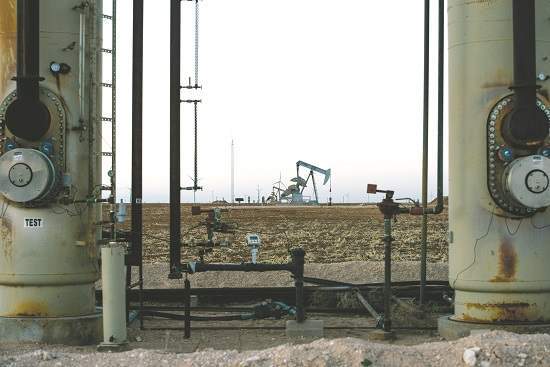Both Bloomberg and Goldman predict that oil prices will overshoot the $85 average in 2023. Such a conclusion seems counterintuitive under the decreases in the price of oil last week. The WTI price reached $66.7 per barrel, while the Brent mix price was $69.8 per barrel on last Sunday.
اضافة اعلان
However, the price was predicted to rise due to the severe reductions in the oil reserves of the US and, in particular, Japan.
 A pump jack in Stanton, Texas, on February 21, 2021. (Photo: NYTimes)
A pump jack in Stanton, Texas, on February 21, 2021. (Photo: NYTimes)
The $85 per barrel expectation was challenged by the statements made by International Monetary Fund (IMF) Managing Director Kristalina Georgieva on December 3 at the press conference after the joint World Bank/IMF ministerial meetings. She said that the IMF will have to revise its world economic growth estimates, published last October, according to which the world economic growth rate will be 5.7 percent in 2021 and 4.7 percent in 2022.
Many countries seem to want to adopt more restrictive and preventive measures to offset the high speed at which the Omicron variant spreads. The IMF official said that these measures will not cause a crash, but a dent in the growth estimates, which will be revised and published in the IMF December report.
Moreover, shale oil producers are not convinced to take risks by expanding their production to full capacity. They are worried that the fluctuations in the price of oil could cost them dearly if they overshot the supply. Should this happen, they stand to lose large amounts.
Yet, Goldman acts bullish and buys and hedges against potential oil price increase.
What if a nuclear deal with Iran is reached? What if Iraq reaches its full production potential?
The Organization of the Petroleum Exporting Countries (OPEC) reached an agreement with Russia to increase oil supplies by only 400,000 barrels per day, or 1.3 percent increase. But can this agreement be sustained in light of the cold war currently waged by US and NATO, on one side, and Russia, on the other? Will the US exercise its leverage on Saudi Arabia and its GCC partners to increase production by much larger quantities?
Saudi Arabia and Russia benefited immensely from the understandings. Oil prices could have dipped to $50 if OPEC+1 had not harmonized its price policies. To undo such an arrangement may not be tenable in near future.
If oil prices could hit the $85 level, then Bloomberg and Goldman will be aptly rewarded. However, should this prediction fails to happen, these two leading financial and trading institutions will suffer tremendously, both financially and in terms of prestige and standing.
Can they exercise their influence to prevent such a happening from occurring, i.e., by creating the conditions which would control oil supply and enhance the demand for it?
One way is to limit the chance of a successful outcome of the nuclear negotiations with Iran. Another is if inflation rises and pushes oil prices up, especially if the world economy shows signs of higher growth in the second half of 2022 and beyond, particularly in the developing economies where such growth is biased in favor of intensive oil production and consumption.
It is difficult to predict with high certainty where the price of oil would go.
Jawad Anani is an economist and has held several ministerial posts, including former deputy prime minister and former chief of the Royal Court.
Read more Opinion and Analysis



